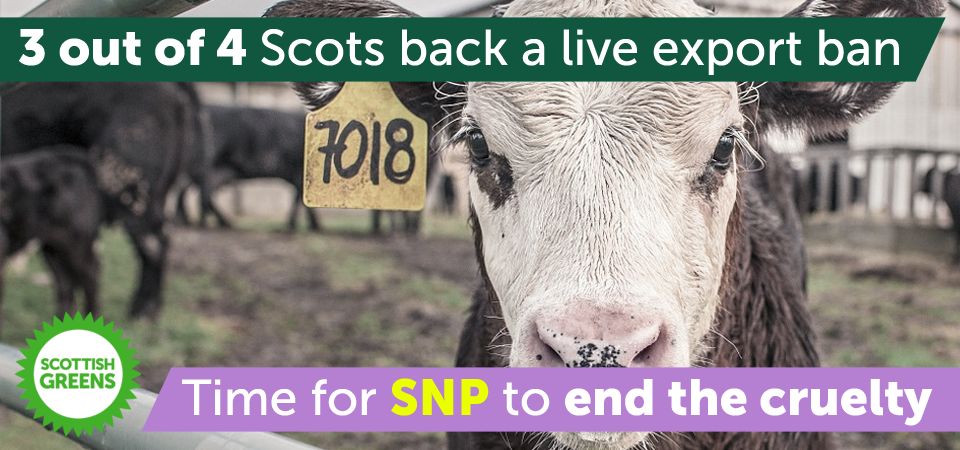The export of live animals is unnecessary

The footage in BBC Scotland’s Disclosure: The Dark Side of Dairy documentary was shocking, but not unexpected. The issue of live exports has been bubbling away in the Scottish Parliament, ever since the Cabinet Secretary, Fergus Ewing, had an unprompted outburst back in February and said: "Let me be absolutely clear, [a ban on live exports] is one UK-wide framework the Scottish government will not be participating in”.
Since then, the Scottish Government’s position has been somewhat confused, with Mr Ewing telling me in a letter from March this year that ‘For clarification, there are currently no animals exported to other EU states for the purposes of slaughter, with the exception of animals transported to Northern Ireland or the Republic of Ireland’. It seemed strange he would wish to defend a trade whilst simultaneously claiming it was non-existent.
Eventually, a Written Parliamentary Question I lodged forced the Government to publish the figures showing the extent of the trade in live animals. In 2017, over 6,000 cattle and 3,000 sheep were sent to countries outside of the UK for either slaughter or production.
As the BBC documentary showed, the Republic of Ireland is often only a stopping off point for animals making much longer journeys onto Spain, France or even North Africa. Furthermore, the definition of ‘production’ in this context is very loose, and can often mean slaughter in all but name, with some animals being slaughtered within days of arriving at their final destination. We need to ensure all animals, that are not the highly prized and well looked after breeding stock, are given the same protection from these cruel and stressful journeys.
Until now, regulations on animal transport and welfare have been set centrally by the EU, but Brexit places an obligation on us to review our practices and take a second look at animal welfare. That the Scottish Government should continue to support this trade in live, sentient creatures exposes the short sighted, sometimes retrograde approach to agricultural and animal welfare policy.
In their response to the documentary, the National Farmers Union has suggested that we only have two options for male dairy calves – ship them or shoot them. That simply isn’t the case, and a ban on live exports would focus the industry, and the Scottish Government’s attention on more ethical, sustainable options.
A number of farms in Scotland – in particular Mossgiel Farm in Ayrshire and The Ethical Dairy in Dumfries – are pioneering ways to keep calves with their mothers whilst still producing milk for human consumption. This places less stress on the mothers, whilst the calves can be reared on site and provide an extra income for the farm as rose beef further down the line.
Combined with organic holistic pasture management - which increases the biodiversity in traditional pasture land, reduces the pressure of over-grazing and high stocking densities and removes the need for artificial inputs like fertilisers - sustainable dairy farming can and must play an important role in reducing the impact agriculture has on our environment.
Yes, this means organic, ethical milk is more expensive than your usual supermarket pint, but the current intensive dairy industry is no longer economically or environmentally viable. Since 2002, nearly half of dairy farmers in Britain have gone out of businesses, with some farms being paid as little as 15p per litre for their milk.
Mossgeil Farm are now selling direct to customers for £1.25 per litre, and recently launched their plastic-free roadside milk vending machine just a few hundred yards away from the fields where the cows graze. Having nearly been forced out of farming just a few years ago, they are now thriving – and crucially, not shipping out their male dairy calves for another country to deal with.
The continued export of live animals in Scotland is a cruel and unnecessary by product of an industry in crisis. There is simply no room for such cruelty in a modern Scotland, and the SNP Government needs to wake up and listen to the 73% of voters who recently said they supported a ban on the trade.
Rather than an existential crisis, a live exports ban, combined with financial support for those transitioning to sustainable calf-at-hoof dairying, could be the catalyst we need to revitalise the dairy industry and lead the way towards a farming system fit for the future.

